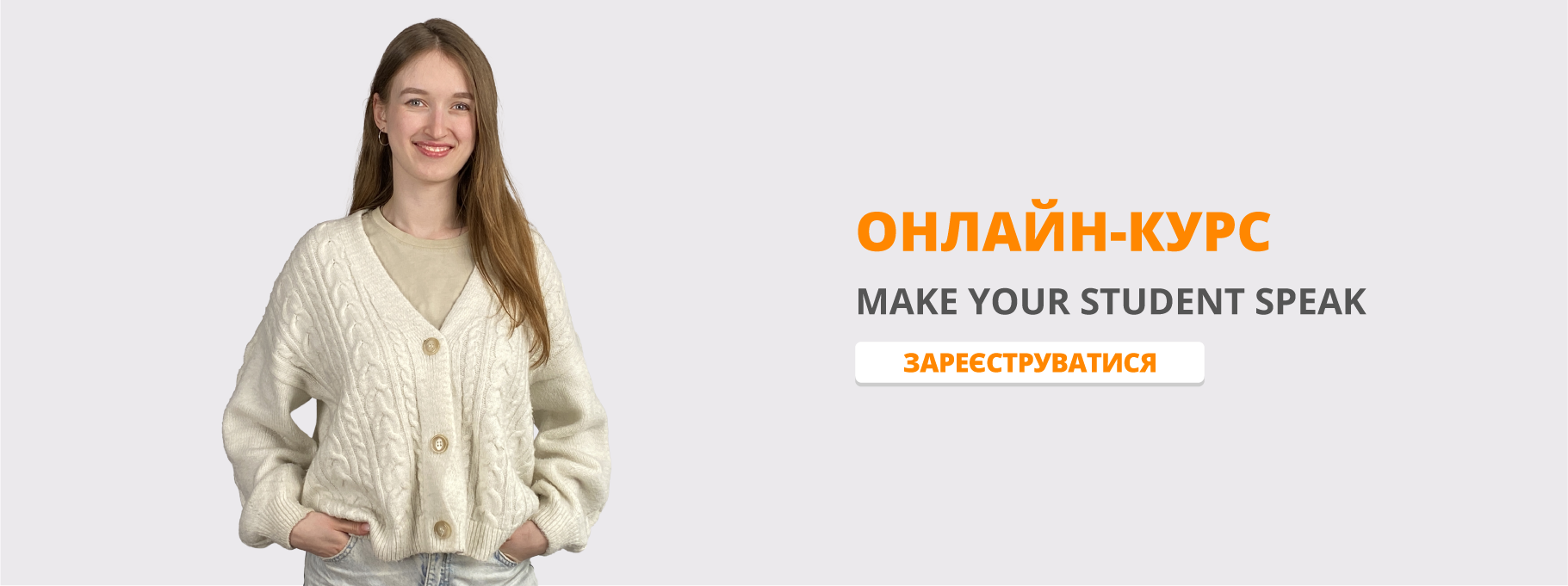Урок, Everyday life. Job Seeking. Job interview (New Destinations B1)
Module 3b Everyday life
Topic: Job Seeking. Job interview
Aims: -to enable the learner to communicate effectively and appropriately in real life situation; to develop and integrate the use of the four language skills; to use English effectively for study purpose across the curriculum; to develop reading skills - prediction/skimming/scanning/inferring; to present and practice vocabulary to talk about personality characteristics
Type of the lesson: formation and improvement of skills and abilities
Plan
- Greeting
- Warm up
-
Actualization of basic knowledge
- Check on home task
- Word formation
- Aim and topic of the lesson. Motivation
-
Reading
- Pre-reading
- Vocabulary explanation
-
Discussion in groups
- While-reading
- Identifying the main idea of the text
- Reconstructing the text
- Comprehension questions
-
Identifying word meaning
- Post-reading
- Discussion
-
Listening comprehension
- Pre-listening
-
Discussion in groups of four
- While-listening
- Listening for gist
- Listening for specific information
- Writing a CV
- Acquaintance with the structure of a CV
- Development of the linguistic guess
- Guidelines and tip for writing a CV
- Improving speaking skills
- Reflexion. Marks
Procedure
- Greeting
T: Good afternoon, students! How are you feeling?
Ss: I’m … (the smileys are shown in the screen). Slide 1
T: Is anybody absent today?
- Warm up
- Discussion Slide 2-3
T: Look at the pictures on the slide and tell which of the aspects you think people consider important when looking for a job?
Ss: I think people consider … important when looking for a job.
T: Can you think of other things that are important?
Ss: I can think of … that are also important.
T: What would your ideal job be? Why?
Ss: My ideal job would be… because …
T: Well done. Thank you for your ideas.
- Actualization of basic knowledge
- Check on home task
T: What was your home task for today?
Ss: Our home task was to write an informal letter to the friend giving news and attach it to the Google classroom.
T: Is anybody who hasn’t done this task?
- Word formation Slide 4
T: Read the definitions and write the job names. Use the suffixes in bold:
-er
1) somebody who cuts, shapes and colours people’s hair a hairdresser
2) somebody who works at an educational establishment and gives knowledge to others a teacher
- or
3) somebody who translate one language into another a translator
4) somebody who works in the kindergarten an educator
- ist
5) somebody who is a specialist in psychology a psychologist
6) somebody who works at a reception desk and welcomes people a receptionist
- ian
7) somebody who plays a musical instrument a musician
8) somebody who works in a building where books are kept and issued to readers
a librarian
- Aim and topic of the lesson. Motivation Slide 5-6
T: Can you guess the topic of our today’s lesson?
Ss: Work / Professions / Looking for a job …
T: You’ve almost guessed it. Today we’ll speak about Job seeking and Job interview. By the end of the lesson you’ll know how to get a good position and how to become a perfect applicant for the employer. You will be able to discuss different views on a topic given, ask relevant questions to seek clarification.
T: What do you expect from our lesson?
Ss: I expect to know what is important for a successful job interview.
I expect to learn new words and expressions on the topic.
I expect to spend time with benefit.
I hope to improve my speaking skills.
-
Reading
- Pre-reading Slide 7
- Vocabulary explanation
T: Be ready to work in groups of four. Look at the slide and try to explain the meanings of the words and expressions.
|
1. |
anxiety |
a feeling of worry |
|
2. |
appropriate |
suitable or proper in the circumstances |
|
3. |
body language |
the process of communicating nonverbally through conscious or unconscious movements and gestures |
|
4. |
CV |
a brief account of a person’s education, qualifications, and previous experience, typically sent with a job application |
|
5. |
facial expression |
a form non-verbal communication in which an affect display is communicated via the face |
|
6. |
gesture |
a movement of part of the body to express an idea |
|
7. |
income |
money received, especially on a regular basis |
|
8. |
position |
is a function you serve at a company |
|
9. |
responsibility |
the state or fact of having a duty to deal with something |
|
10. |
salary |
a fixed regular payment, typically paid on a monthly basis |
|
11. |
self-confidence |
a feeling of trust in one’s abilities, qualities |
|
12. |
up-to-date |
modern, incorporating the latest developments |
|
13. |
genuine |
authentic, truly that something is said to be |
|
14. |
spill (v) |
reveal confidential information to someone |
|
15. |
take into consideration |
take into account, is to think about something before one makes a decision |
- Discussion in groups Slide 8
T: Look at the questions on the slide, reflect on them. Then discuss them in groups of four for a minute. Choose a speaker to present your idea.
- Have you ever been interviewed for a job or for anything else? If yes, how did you feel?
- In your opinion, which of the following are most important in a job interview?
- CV
- knowledge
- appearance
- behavior
-
body language
- While-reading
- Identifying the main idea of the text Slide 9
T: Look at the Act. B on p.44 in your SB. One student read the task aloud: Read the text quickly without paying any attention to the missing sentences and choose the most appropriate titles a, b or c.
- Tips for a successful interview
- How to dress for success
- What to say at a job interview
Key: a (b and c are wrong because they refer only to certain topics touched upon in the text but not the text as a whole)
- Reconstructing the text Slide 10-11
T: Before reconstructing the text, look at the six sentences removed from it. It’s Act. C on p.45 in your SB. Read them in chain. Do you understand them?
T: Choose the one which best fits each gap (1-5). There is one extra sentence, which you do not need to use. You have 3 min. to do this activity.
T: Let’s check the answers, reading one by one.
Key: 1. B (This sentence introduces the idea of the CV and is elaborated on in the next sentence “it is very important to make sure your CV is up-to-date and free of mistakes.”)
2. A (This sentence specifies the frequently asked questions in interviews, something referred to in the next sentence “…try answering these specific questions…”)
3. D (This sentence explains exactly how videotaping one’s self can contribute to a successful interview.)
4. C (This sentence further expands on the idea of knowing the location of the interview by suggesting a practical measure “a practice drive…”)
5. F (This sentence mentions the necessity of sending a thank-you note, an idea which is analysed in the following sentence “In it, you should…”)
- Comprehension questions Slide 12
Look at the questions on the slide. Ask and answer them in chain.
- How does the article suggest that a candidate should gather information about the post advertised?
- By reading magazines, newspapers and by browsing the Net for information concerning the specific company.
- Why can videotaping one’s self be helpful?
- By seeing one’s performance he/she can improve him/herself by practising.
- What should a successful candidate never ask about?
- The salary that is offered.
- What kind of closing should one choose?
- A clean and well ironed business suit.
- What do you include in a thank-you note?
- You express your interest and explain your specific qualifications which make you the ideal candidate for the position.
- Identifying word meaning Slide 13
T: Read through the words 1-6 and the meanings a-f from Act. D, on p.45. You can find the words in the text, where they are highlighted and guess their meanings from the context. Then match them with their meanings.
Key: 1-d, 2-a, 3-e, 4-f, 5-c, 6-b
- Post-reading
- Discussion Slide 14
T: Discuss the question: “Which of the tips mentioned in the text do you find most helpful? Why?”
-
Listening comprehension
- Pre-listening
- Discussion Slide 15
T: Work in groups of four for 2 min. Write down three questions you think a person might be asked at a job interview. Present them.
- While-listening
- Listening for gist
T: Listen to a job interview and compare the questions the interviewer asked with your ideas.
- Listening for specific information
T: Read through questions 1-5 and the options given in Act. C, on p.47. Then listen to the recording again and choose the correct answer a, b or c. One of the students read the answers and the others check on them.
Key: 1-a, 2-b, 3-a, 4-c, 5-b.
- Writing a CV
- Acquaintance with the structure of a CV Slide 16
T: Read Sheila Patterson’s CV and match the headings a-e with the parts of the CV 1-4. There is one extra heading which you do not need to use.
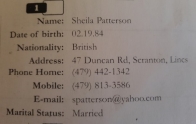
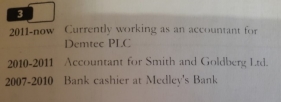

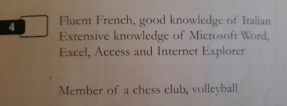
- Education
- Personal details
- Skills and interests
- Foreign languages
- Work experience
Key: 1-b, 2-a, 3-e, 4-c.
- Development of the linguistic guess Slide 17
T: Read the following advertisements. Which of the three jobs is most suitable for Sheila Patterson? Why?
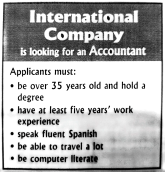
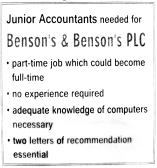
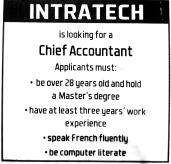
- Guidelines and tip for writing a CV Slide 18
T: Read the guidelines and the tip. Then write your own CV at home and attach it to the Google classroom.
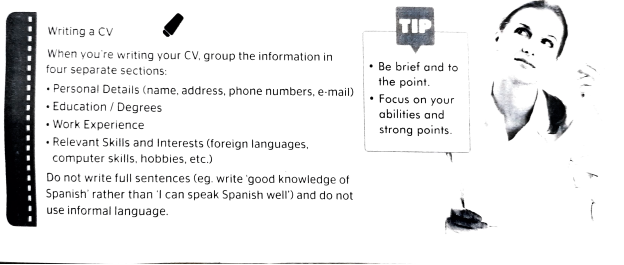
- Improving speaking skills Slide
T: Talk in pairs.
Student A: Imagine that you’re applying for a job and Student B is interviewing you. Tell her which job you’re applying for and answer her questions.
Student B: Imagine that Student A has applied for a job in your company. Interview her using the prompts below.
- Why / want / change jobs?
- What / duties / have / previous job(s)?
- What / not like / about / previous job(s)?
- Can / tell / about / education / skills / hobbies?
- What / find / interesting / about / this job?
- Why / think / you / be / suitable / for / this job?
- Be able / work / overtime?
- Reflexion. Marks
T: Let’s summarise our work at today’s lesson. Complete the table.
|
What emotions do you feel? I feel Positive emotions Negative emotions satisfaction dissatisfaction happiness irritation joy boredom success sadness admiration anxiety proud fair surprise Why? Because I … |
|
can understand the information say my opinion on … find necessary information express my attitude to …
found out … learnt … remembered … |
T: Have your expectations come true?
I would like to thank … for excellent work, … for good work. And I’d like some students be more active, work harder next time.
Our lesson is over. Good bye. Have a nice day!


про публікацію авторської розробки
Додати розробку
